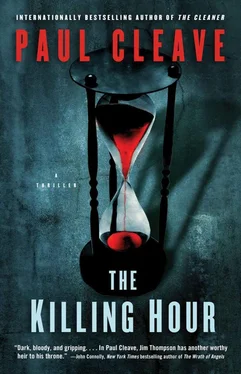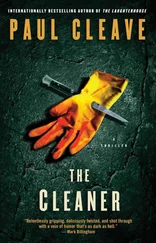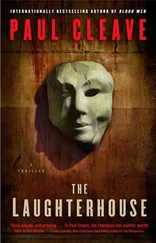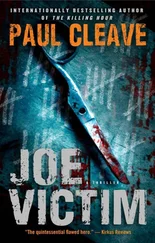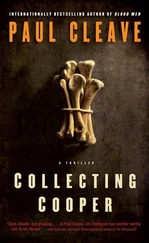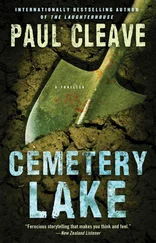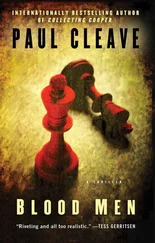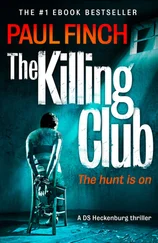Paul Cleave - The Killing Hour
Здесь есть возможность читать онлайн «Paul Cleave - The Killing Hour» весь текст электронной книги совершенно бесплатно (целиком полную версию без сокращений). В некоторых случаях можно слушать аудио, скачать через торрент в формате fb2 и присутствует краткое содержание. Год выпуска: 2007, ISBN: 2007, Издательство: Atria Books, Жанр: Триллер, на английском языке. Описание произведения, (предисловие) а так же отзывы посетителей доступны на портале библиотеки ЛибКат.
- Название:The Killing Hour
- Автор:
- Издательство:Atria Books
- Жанр:
- Год:2007
- ISBN:9781451677812
- Рейтинг книги:5 / 5. Голосов: 1
-
Избранное:Добавить в избранное
- Отзывы:
-
Ваша оценка:
- 100
- 1
- 2
- 3
- 4
- 5
The Killing Hour: краткое содержание, описание и аннотация
Предлагаем к чтению аннотацию, описание, краткое содержание или предисловие (зависит от того, что написал сам автор книги «The Killing Hour»). Если вы не нашли необходимую информацию о книге — напишите в комментариях, мы постараемся отыскать её.
The Killing Hour — читать онлайн бесплатно полную книгу (весь текст) целиком
Ниже представлен текст книги, разбитый по страницам. Система сохранения места последней прочитанной страницы, позволяет с удобством читать онлайн бесплатно книгу «The Killing Hour», без необходимости каждый раз заново искать на чём Вы остановились. Поставьте закладку, и сможете в любой момент перейти на страницу, на которой закончили чтение.
Интервал:
Закладка:
Her name is Erica, and Erica is the sort of woman I would be flirting with if I didn’t appear and feel half-dead and think the woman I possibly still love might be dead. The small cream office has no window so the only view is the single door we came through, an aerial photo of Christchurch hanging on the wall and a vase filled with plastic roses. I look at the photo and wonder where I was when it was taken. More people were alive then. On the opposite wall is a photo of a guy in his forties or fifties. It has his name and two years listed beneath him, one must be his year of birth, the other is last year-it must be the bank manager who was killed during the robbery.
A long desk with a computer and stacks of paper and office clutter sits close to the middle of the room with a chair on each side. It feels like an interrogation room, and when she starts asking me questions to prove my identity I look around for two-way mirrors. I wait for her to ask where I was on Sunday night, but she doesn’t. I can see her desire to inquire about my bruises and cuts, but she can’t bring herself to do so. She keeps brushing her hair back behind her right ear in a nervous way. She knows something isn’t right, but what can she do? She can think and she can suspect. But it’s my money. A small necklace with a silver crucifix hangs around her neck. I feel like letting her in on the big secret.
After fifteen minutes of signing papers Erica agrees to hand over my money. It takes the staff another fifteen minutes to get the cash from their vault, and they count it out in front of me in a timid way that makes me think that they think I might be one bad-hair day away from shooting them all. They pack it into a small linen bag. I look for the huge dollar sign on the side to make it more obvious, but don’t see one. I thank Erica, then before leaving, I take out the wads of notes and stuff them inside my jacket and pants pockets. It’s a tight fit.
I walk a few blocks to the north, skirting around a crane and some cement mixers and several workmen who don’t appear to be doing anything. In Christchurch there are always workmen working on shops. All the time. I do what I should have done six months ago, and buy a prepay cell phone. Then I walk to a nearby army surplus store. The walls are painted camouflage green, which makes the building stick out more. Mannequins in the window are wearing desert and jungle uniforms. Plastic people off to war. I walk inside. The lighting is dim and the air is warm. Uniforms and outfits are hanging from wire coat hangers. Stacked all over the place are army storage containers with yellow and white lettering stenciled on them. Old medals in glass cases. Old gas masks. Old everything. I look at a counter full of knives. I find a hunting knife with a sharp blade and with ridges along the top.
The guy behind the counter stands around six and a half feet and has large, flabby arms covered in White Power tattoos. He wears a black leather vest with a black T-shirt beneath it. The T-shirt says Guns don’t kill people. Grenades do. His head is shaved and he has a long, gray beard. A name badge attached to his vest says Floyd and it looks out of place on his huge chest. He tells me the knife is called a KA-BAR.
I put the knife aside and keep looking. Floyd follows me around. It makes me feel uncomfortable. He asks if he can help. I tell him I’m after some fatigue gear. He shows me where it is. It’s new, not like most of the stuff in here. I wonder if anybody died in any of these uniforms. I pick up a vest with lots of pockets and army pants and an army jacket and boots too. I grab a pair of compact 8 x 20 binoculars that can fit in one of the many pockets in the vest.
I put them with the knife then look through a small display of Swiss Army knives. I point to one that looks like it could do everything from repairing sunglasses to gutting a fish. He pulls it out and puts it next to the KA-BAR. The KA-BAR looks massive in comparison. I pull out my wallet. Floyd says nothing as he looks me up and down. He looks like he could break every bone in my body so I smile at him and make no conversation.
“You going hunting?” he asks.
“Yep.”
“What you hunting for?”
“Deer.”
“Uh huh. The two-legged type?”
I pay for the gear. He gives me my change.
“No. The four-legged type.”
“Okay,” he says.
“I’m thinking,” I tell him, “that it may be easier to shoot deer than stab them. Is that right?”
“What kind of trouble are you in, mister?”
I hand him five hundred dollars. “The kind that needs a gun. Where can I get one?”
He stares at the money. Then he stares at me. “You’re about halfway to me telling you how that can be done.”
I count out another five hundred and put it on the counter next to the first five hundred. He sweeps his hands across it and it all disappears. Then he gives me a name, tells me to go and see this guy tomorrow.
“Not today?” I ask.
“You need to go shooting deer today?”
“No,” I tell him.
“Then tomorrow will be fine then, won’t it.”
He puts my purchases into a plastic supermarket bag. I thank him and leave.
I get back to my car just as a traffic cop is about to give me a ticket. He’s a guy in his thirties who looks like he’s spent twenty of those years either lifting heavy weights or doing hard time. He looks up at me and before I can say anything, he says “Looks like you’ve had a tough day.”
“Yeah.”
“How about I don’t make it any tougher for you? Next time put enough coins in the meter, okay?”
I almost feel like hugging him, and it restores some of my faith in the city.
I drive out to the airport and pull into medium-term parking, where Jo’s car can stay for the next few days, or where the police will eventually find it after I’m dead. The walls of the rental agency I choose are painted bright orange with blue racing stripes around the middle. The windows and glass sliding doors are covered in stickers and decals. I step inside and an assistant high on caffeine goes through the paperwork with me as I rent a late-model Holden, similar to the one I saw outside the bank. I figure driving around in my own car is a pretty dumb thing to do since Cyris knows it so well.
I show the guy my driver’s license and he looks at me and then at the photo. I shrug. “Car accident,” I tell him.
“Car had fists, did it?”
“Something like that.”
“You should take out the insurance,” he says.
So I take out the insurance. I sign the credit-card form and the guy tells me to keep the pen. I add the car key to my others.
The Holden is a much nicer drive than my Honda and Jo’s Mazda, but it doesn’t make the situation seem any better. Just more comfortable. I throw my free pen in the glove box where it sits next to a map and a box of tissues and an instruction booklet. Back home I charge the cell phone. I change the outgoing message on my answering machine so it includes my new cell number.
I’m about to make something to eat when suddenly I realize I don’t want to touch any of the food that’s in my house since both Cyris and Landry have been in here. Problem is I’m starving. I get back into my car and drive a few minutes to some local shops and spend a few minutes buying some food. I’m driving back home when the answer to one of my questions hits me. I’ve been wondering why Cyris didn’t take his two victims into the middle of nowhere. It’s because he wanted them found. He didn’t want them found at home, but he didn’t want them to be missing forever. He wanted them found side by side in a pasture by a common highway. He would have left the stolen van there with blood in it. Maybe he’d have left other stuff on the sidewalk, like some sliced up clothes. The cops would have searched the area. This way the motivation for the abductions and murders looks obvious-it looks like a sick bastard doing what he enjoys most. Cyris wanted them found.
Читать дальшеИнтервал:
Закладка:
Похожие книги на «The Killing Hour»
Представляем Вашему вниманию похожие книги на «The Killing Hour» списком для выбора. Мы отобрали схожую по названию и смыслу литературу в надежде предоставить читателям больше вариантов отыскать новые, интересные, ещё непрочитанные произведения.
Обсуждение, отзывы о книге «The Killing Hour» и просто собственные мнения читателей. Оставьте ваши комментарии, напишите, что Вы думаете о произведении, его смысле или главных героях. Укажите что конкретно понравилось, а что нет, и почему Вы так считаете.
